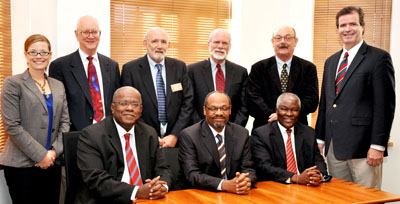 |
|
Pictured here, from the left, back, are visitors from Texas and UFS management: Ms Stephanie Curs (Director: Office of the Vice President for Global Initiatives), Dr Edwin Price (Associate Vice-Chancellor for International Agriculture and Director of the Norman Borlaug Institute for International Agriculture), Dr Mike Greenwald (Professor and Program Director for the International Studies Program, College of Liberal Arts), Prof. Ward Wells (Professor and Associate Head for Professional Programs, College of Architecture, and Director of Academy for Visual and Performing Arts), Dr Glen Mills ( Professor and Head of Department of Architecture), and Dr Alan Sams (Executive Associate Dean, College of Agriculture and Life Sciences); front: Prof. Jonathan Jansen (Rector and Vice-Chancellor, UFS), Mr Eric Bost (former USA Ambassador to South Africa and Vice-President for Global Initiatives), and Prof. Ezekiel Moraka (Vice-Rector: External Relations, UFS). – Photo: Stephen Collett.
|
A high-level delegation from Texas A&M University in the USA, led by Mr Eric Bost, Vice-President Global Initiatives and previous USA Ambassador to South Africa, visited the University of the Free State (UFS) recently. The objective of the visit was to forge strategic linkages and research partnerships within the ambit of Texas A&M’s expanded Africa strategy.
Texas A&M has 50 000 students, and is internationally renowned and highly rated for its scholarship, academic achievement and excellent research profile. The delegation consisted of representatives from the President's Office, various deans and heads of departments.
The discussions during the visit identified a number of shared interests and common research foci, and colleagues were unanimous in their pursuit to strengthen the relations.
In January 2009 Mr Bost delivered his final official address as US Ambassador to South Africa on the UFS Main Campus. Mr Bost, a close friend of the UFS, has since sparked numerous activities to further the transformation agenda at the UFS, and is very supportive of the work of the International Institute for Race, Reconciliation and Social Justice. A number of Fulbright senior specialists from the US are participating in the further conceptualisation, roll-out and activities of the Institute.